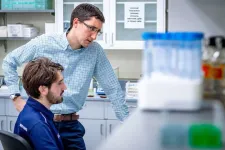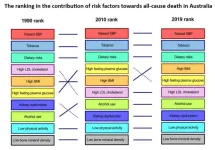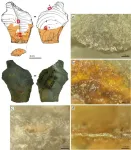In the phase 2 study, the drug rusfertide limited excess production of red blood cells, the main manifestation of polycythemia vera, over the 28-week course of treatment. The results suggest it could replace therapeutic phlebotomy, a common form of treatment which has proven to be a burden for many patients. The results of the study were published today in The New England Journal of Medicine.
“Rusfertide appears to represent a significant step forward in treating polycythemia vera through its unique approach of limiting the amount of iron available for blood cell production,” says Marina Kremyanskaya, MD, PhD, Associate Professor of Medicine (Hematology and Medical Oncology) at Icahn Mount Sinai and lead author of the study.
Dr. Kremyanskaya, who serves as Medical Director for inpatient oncology at The Mount Sinai Hospital, has conducted leading-edge research into myeloid blood cancers. “Pending further clinical studies, this injectable agent could become a valuable therapeutic tool for a disease which many patients and their physicians struggle to bring under control,” she says.
“This groundbreaking work would not have been possible without my Mount Sinai co-investigators, Ronald Hoffman, MD, and Yelena Ginzburg, MD. With their close collaboration, we were able to take laboratory findings from the bench to bedside,” says Dr. Kremyanskaya. Dr. Hoffman is Professor of Medicine (Hematology and Medical Oncology) at Icahn Mount Sinai, a senior author on the publication, and a prominent researcher and clinician in the field of myeloproliferative neoplasms. Dr. Ginzburg, Professor of Medicine (Hematology and Medical Oncology) at Icahn Mount Sinai, is an expert in iron metabolism; her basic science work provided a significant preclinical rationale for the investigation.
Polycythemia vera is a rare type of chronic myeloproliferative neoplasm, with 1-3 new cases per 100, 000 people are diagnosed each year, in the United States. It occurs when the bone marrow overproduces blood cells, a condition also known as erythrocytosis, which can thicken the blood and increase the risk of heart attack, stroke, and other blood clots. Current therapies include aspirin; medications that can reduce red blood cells in the bloodstream, such as hydroxyurea, interferon, and ruxolitinib; and phlebotomy, which involves withdrawing blood using a needle in a vein to reduce blood volume. Frequent phlebotomies have proven onerous for patients due to the need for prolonged physician visits. They can also worsen iron deficiency symptoms that already afflict many polycythemia vera patients. In addition, patients are often intolerant or fearful of this treatment option. Moreover, studies have shown that with currently available treatment options, many patients will often have hematocrits, the percentage of red cells in your blood, above the clinically safe level of 45 percent, leaving these patients at higher risk for complications.
The Mount Sinai-led REVIVE trial was conducted at 16 centers in the United States and India and funded by Protagonist Therapeutics, Inc., the drug’s manufacturer. Rusfertide was evaluated for safety and efficacy in 70 phlebotomy-dependent polycythemia vera patients. The researchers found that the agent was associated with improved and sustained control of hematocrit levels below 45 percent during the 28-week dose-discovery period, and was superior to placebo during the ensuing 12-week withdrawal period. Patients with a high burden of symptoms such as pruritis (itchy skin), night sweats, difficulty concentrating, and fatigue also reported improvements following treatment with rusfertide, which was well tolerated.
Rusfertide is an injectable medication which patients can self-administer at home. It works in the body by mimicking hepcidin, a hormone produced by the liver that serves as a master regulator of iron trafficking. It blocks the export of iron to the blood in a dose-dependent manner, which results in functional iron deficiency and decreased red blood cell production.
“Rusfertide shows great promise for achieving sustained hematocrit control in polycythemia vera patients. Just as importantly, it decreased the need for repeat phlebotomies, with some patients remaining virtually free of the procedure for more than two and a half years,” notes Dr. Kremyanskaya.
A phase 3 clinical trial, also sponsored by Protagonist Therapeutics, is now underway at global sites, with Mount Sinai again playing a leadership role.
About the Icahn School of Medicine at Mount Sinai
The Icahn School of Medicine at Mount Sinai is internationally renowned for its outstanding research, educational, and clinical care programs. It is the sole academic partner for the eight- member hospitals* of the Mount Sinai Health System, one of the largest academic health systems in the United States, providing care to a large and diverse patient population.
Ranked 13th nationwide in National Institutes of Health (NIH) funding and among the 99th percentile in research dollars per investigator according to the Association of American Medical Colleges, Icahn Mount Sinai has a talented, productive, and successful faculty. More than 3,000 full-time scientists, educators, and clinicians work within and across 44 academic departments and 36 multidisciplinary institutes, a structure that facilitates tremendous collaboration and synergy. Our emphasis on translational research and therapeutics is evident in such diverse areas as genomics/big data, virology, neuroscience, cardiology, geriatrics, as well as gastrointestinal and liver diseases.
Icahn Mount Sinai offers highly competitive MD, PhD, and Master’s degree programs, with current enrollment of approximately 1,300 students. It has the largest graduate medical education program in the country, with more than 2,000 clinical residents and fellows training throughout the Health System. In addition, more than 550 postdoctoral research fellows are in training within the Health System.
A culture of innovation and discovery permeates every Icahn Mount Sinai program. Mount Sinai’s technology transfer office, one of the largest in the country, partners with faculty and trainees to pursue optimal commercialization of intellectual property to ensure that Mount Sinai discoveries and innovations translate into healthcare products and services that benefit the public.
Icahn Mount Sinai’s commitment to breakthrough science and clinical care is enhanced by academic affiliations that supplement and complement the School’s programs.
Through the Mount Sinai Innovation Partners (MSIP), the Health System facilitates the real-world application and commercialization of medical breakthroughs made at Mount Sinai. Additionally, MSIP develops research partnerships with industry leaders such as Merck & Co., AstraZeneca, Novo Nordisk, and others.
The Icahn School of Medicine at Mount Sinai is located in New York City on the border between the Upper East Side and East Harlem, and classroom teaching takes place on a campus facing Central Park. Icahn Mount Sinai’s location offers many opportunities to interact with and care for diverse communities. Learning extends well beyond the borders of our physical campus, to the eight hospitals of the Mount Sinai Health System, our academic affiliates, and globally.
-------------------------------------------------------
* Mount Sinai Health System member hospitals: The Mount Sinai Hospital; Mount Sinai Beth Israel; Mount Sinai Brooklyn; Mount Sinai Morningside; Mount Sinai Queens; Mount Sinai South Nassau; Mount Sinai West; and New York Eye and Ear Infirmary of Mount Sinai.
END






